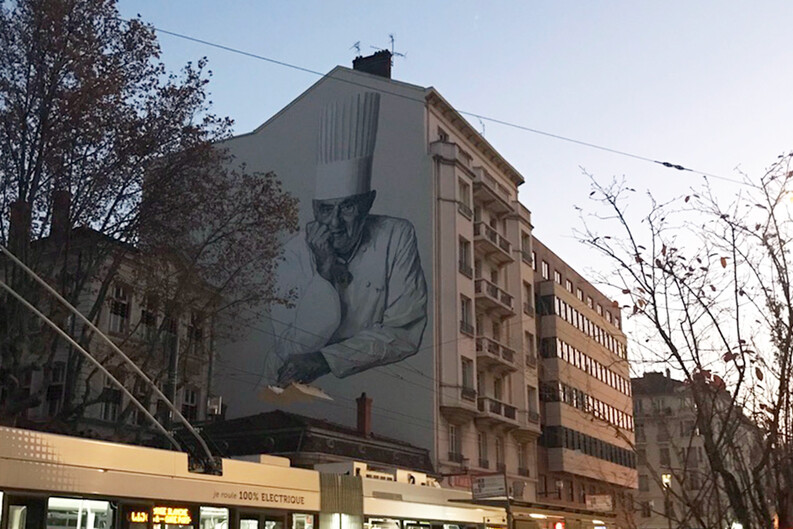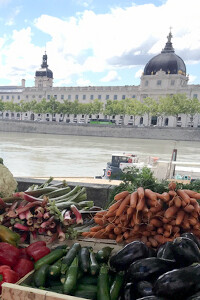Q&A: LEAP Student Grant Recipient Annie Crabill

Law, Ethics & Animals Program4 (LEAP) Student Fellow Annie Crabill is an M.A. candidate at Yale’s Jackson Institute for Global Affairs and a Student Grant Program5 recipient. Last fall, as part of her grant project, she traveled to Lyon, France, to investigate a controversy embroiling the new mayoral administration, which had announced a vegetarian school lunch program. She is currently synthesizing the project into an article about cuisines, climate change, and local government.
LEAP Program Fellow Noah Macey spoke with Crabill about her project. The following interview has been edited for clarity.
What’s the background of the controversy in Lyon, and how did you decide to study this lunch program?
I first learned about this story unfolding in Lyon via a New York Times article6 that was covering this explosive debate. I’ve since learned that the Lyonnaise refer to this incident as la polémique, which means “the controversy.”
What had happened was that the Green Party mayoral candidate won the Lyon city election in 2020, as part of a broader “Green Wave” that took France in 2020. Then, in February of 2021, there was a restrictive health protocol issued by the French national government. It imposed space constraints about how many kids could be served indoors during lunchtime every day, and so on.
In France, the school lunches are pretty lovely — you have multiple choices and menus for each day. Because of the public health crisis, the Green Party chose to offer only one menu, and in order to accommodate the most students and make it inclusive, they chose not to offer meat. That’s how they ended up with the meatless menu.
And meatless didn’t mean vegan, or even vegetarian — fish and eggs were often served, and every meal had a dairy product. But even so, there was a crazy backlash at the national level. The French minister of agriculture tweeted that the Lyonnaise mayor’s policy was anti-French, that it was anti-social, that it was elitist (in French the word they use is bobo, which means bourgeois, Bohemian, crunchy, yoga-type stuff). So there wound up being this classic French protest, which involved farmers who raised animals blocking critical infrastructure with their tractors —they love to do that.
In the midst of this textbook French protest, the New York Times’s Paris Bureau chief, Roger Cohen, went to Lyon to cover the polémique and did a little profile of the mayor. He spoke to a couple different butchers in the city who said that this whole policy was very anti-French.

I read this and thought it was pretty intriguing. I also spoke with someone who writes a lot about meat and vegan policy in general, who said that the Lyon story was interesting because there is little information about the implications or outcomes of these kinds of policies, mostly because they never really happen. So it might have great climate or health effects, but we don’t really have data on this sort of situation because no cities implement these policies at scale.
I had also written a paper about alt meats, which I think are good in general — it’s nice to meet people where they are. But I was wondering about alt meats in countries where food traditions are really important. What does dietary change and eating for the climate look like in countries where people eat quite differently from here?
What did you learn about the controversy once you arrived in Lyon?
There were social, political, and even religious dimensions to the story that I didn’t know much about before arriving. In France there’s this policy of laïcité, which means you can’t ever explicitly accommodate religion in the public sphere. Lyon has a large Muslim population, and the meat they’d serve in schools isn’t Halal. So some people suggested that the vegetarian menus were a sneaky way for this new government to accommodate the Muslim student population.
Once I got to Lyon, I was able to talk with Gautier Chapuist, who created this policy. Even prior to our conversation, I had learned that the Times’s story had been a bit flawed: a meatless school menu was first implemented by the pre-Green Party administration, when France was first going into lockdown around March 2020. But when the old Socialist mayor, Gérard Collomb, did this meatless menu, there was no backlash, no protests, no one accusing him of creating this Trojan horse policy to turn everyone vegetarian.
Less than a year later, they had seen benefits from the single menu. They could get kids through lunch much faster, they didn’t have to order as much food, and it was overall easier. But as soon as the Green Party implemented it, there was a political controversy.
I asked Chapuis why all this was, and his explanation was that it’s political opportunism, a way for the opposition to decry the Green Wave. I was also curious about the overall Green food policy and vision for the future of Lyon, because, the way I saw it, once they’ve rolled out this extreme, emergency policy, it might make it easier to implement less extreme ones. Like reintroducing meat, but serving it less often, which is what they ended up doing.
Some political scientists and people who work in climate politics I spoke to said the opposite — that la polémique made climate action a lot harder, because now people are distrustful of the Greens. Chapuis said he hadn’t thought about it either way and that it hadn’t made anything harder or easier. He really, really insisted that the entire situation was just a pandemic-related measure. It seemed to be an extremely important political message for him to send.
One topic he was very adamant about was that they’d already crafted their revised food policy platform when they took over the school and implemented the meatless menus. So he insists that the menu change has nothing to do with their broader policy goals, just pandemic logistics. There are some related items in that platform — they will always have a vegetarian option every day, they’ll serve meat less frequently, and there’s a push to have 100% organic and 50% locally sourced lunches by the end of 2022.
What did your interviewees say about the changes?
Everyone I was talking to — who were all people who cared a lot about food, who make a good living, who are happy to prioritize food with their money — they kept saying, “We need to eat less meat, but better meat.” That’s a common trope here and in France, but it almost doesn’t require any behavior change on the part of people who consider themselves foodies, who love to shop locally and organically, who are already aware of the health implications of meat. It makes them feel good about the climate to buy high-quality, humanely raised meat. But it's not entirely clear to me that these people are eating less meat.

There’s also some very French traditional ideas about what constitutes a meal, even among people who cook lots of non-French cuisine. One woman who sourced ingredients from all over the world told me she was really concerned because her son eats ravioli at school as a main course. She said something along the lines of, “That’s not right, there’s no protein.” So there remains some idea that a vegetarian menu can’t be complete. That said, they love lentils — that can count as a meat. But that’s because it’s a French tradition: it’s part of what can constitute a proper meal. Dairy is also crucial, and there's even a line item on every school lunch for a dairy product. So there are pretty pervasive ideas about what is healthy, correct, and normal.
There was a bit of a stateside version of a polémique a few weeks ago when Eric Adams, the new mayor of New York, announced that the city’s schools would go vegan on Fridays. I’m wondering if you followed that and if your experience in France affected how you thought about it?
Yes, I was enthused by that. I have seen some pushback about the way it was implemented — it seemed chaotic and there were some issues with the rollout. And there are a lot of health claims that Adams makes that are really beyond dubious, or actually wrong, about the curative power of plant-based foods. But he got rid of processed meats like salami and bologna when he was Brooklyn borough president, so he’s been successful at similar initiatives in the past.
He has this crazy brand, but for some reason I think it’s kind of working, and I think vegan Fridays are a great idea. It’s also a good example of what mayors can do — things that can happen at the city level. That’s another theme in my work on this project: as countries fall down on their climate commitments and national leaders can’t get stuff through, some of the most interesting and active climate policies are happening at the city level. One of the major things that localities can do is food procurement, making sure you’re buying from the right people. And it's something Adams is passionate about.
One of the angles in the New York Times piece was how Lyon sees itself as the gastronomic capital of France. And is there any tension between that image it sells as a food city, and its new vision of itself as a green city? When I asked Chapuis about this, he said that Lyon wasn’t just the gastronomic capital of France — he said it was the gastronomic capital of the world. He said he was trying to be a leader in greening the city and creating a model that other cities can follow, using Lyon’s clout as a city that takes food seriously to help create a powerful example.
France passed a really sweeping climate law in July of last year that had a lot of people mad because it was kind of underwhelming in a lot of ways. But one thing it did do was introduce a requirement for, effectively, meatless Mondays in school. Like, one day a week, schools will serve a vegetarian menu. So now that’s at the national level. On the other hand, there’s a law on the books in France that four out of every 20 meals has to have non-ground meat as the protein source. So there are tensions between wanting to ensure high quality protein and wanting to mitigate climate change.
The Law, Ethics & Animals Program (LEAP) Student Grant Program seeks to support Yale University student-led research and creative projects during the academic year and the summer, focused on advancing understanding of, drawing attention to, and/or developing strategies to address the urgent threats facing non-human animals.


